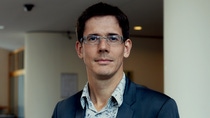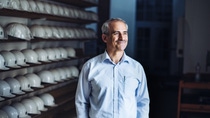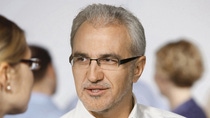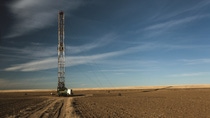News e comunicati
Bas Eickhout

Creating Chemistry: European conventional gas production is decreasing. How do you believe we can best secure Europe’s future energy supply?
Bas Eickhout: It’s clear that if you look at EU fossil fuel production it is going down, but not dramatically quickly. It’s not that we’ll be out of gas tomorrow, but we have to prepare for a future where we have alternatives ready. Climate change is a crucial aspect that has to be taken into consideration. I don’t see an alternative than to prepare for a world which is not built on fossil fuels. That means preparing for a shift away from gas. Gas is a transition path away from coal, but if you look at some studies out there, in 30 to 40 years time Europe can be totally independent of fossil fuels. So the best way to secure Europe’s future energy supply is to invest in nonfossil alternatives, and from my point of view that means renewable energy.
Which role could gas play in securing Europe’s future energy supply?
We do know there is a variability of supply with renewables. You can live with that variability if you connect the different resources and make sure you invest in energy storage as well. But until that moment, that variability is still an issue and gas is the key marriage partner with renewables because it is more flexible than coal or nuclear. Therefore you do need gas in the coming decades. A big question is how much you should expand in gas, and that is very much determined by how much we invest in energy efficiency. If you do that, then we hardly need any increase in gas. And ultimately renewables are the best option to become self-sufficient.
Could shale gas be an option?
I don’t see why it should be. If you really go for the renewables and efficiency, why should we go into an investment like shale gas? I’m not of the school that says shale gas is the end of the world, but politically speaking shale gas brings us on a path that is a dead-end. You can invest a lot and try to make it a bit safer, a bit cleaner. But then why are we going for the last drop of gas when there are alternatives? Pursuing shale gas would lock us into a fossil future. If you start drilling you need to continue drilling in order to see a return on your investment – it becomes a self-fulfilling prophecy.
What kind of regulations do you deem necessary to ensure the safe production of shale gas?
First, you need to make sure water quality is not under threat. Second, the use of chemicals needs to be registered for this purpose. The third is about leakage rates, mainly of methane, which is only now being investigated in the US. The leakage rate determines to a huge extent whether gas is cleaner than coal. And the chances of higher leakage rates with shale gas are considerable.
“I think people in the end will agree that we will have to go for efficiency and renewables. In that overarching strategy shale gas is not needed.”
Bas Eickhout, Member of the European Parliament for GroenLinks, the Dutch Green Party.
Do you think that there is sufficient dialog between energy companies, scientists, regulators, policy makers and the general public? If not, how could this be fostered?
I think the biggest problem at the moment is that it is such a polarized debate, either ‘it’s the end of the world’ or ‘it’s the only solution.’ We really have to invest more in independent research. There are a lot of scientists out there who just want to know for the sake of science, and that should play a far more dominant role.
Do you think the EU could lag behind countries like China and the US in technological and economic development if it doesn’t pursue shale gas?
Easy money in the first year might become very difficult money after that. In the US shale gas is already being questioned more and more. A lot of companies investing in shale gas are getting into difficulties. Going into shale gas is a ‘penny wise, pound foolish’ strategy. No matter what happens, towards 2020, carbon emissions will cost more and more money. So you have a cheap option now but in 10 years’ time it will be far more negative than you think. Especially if you want to meet climate targets; then shale gas needs to be married with carbon capture and storage; one of the most expensive options out there. The fastest increase in energy in Europe is renewables, by 5% a year over the last 20 years. It is increasingly becoming a serious option, look at Germany. You need a trustworthy example of a group of countries – I would say that’s the EU – who can show you can build a prosperous world without fossil fuels.
What do you think is the main reason why people do not support shale gas development?
The main reason is that people look at options individually and there’s always a reason to be against any option. Shale gas is not alone, people don’t like windmills in their back yards either. We have to make clear that there is no cheap option. There - fore we need a more overarching strategy to decide what the most viable option is, given all the circumstances. I think people in the end will agree that we will have to go for efficiency and renewables. In that overarching strategy shale gas is not needed.


